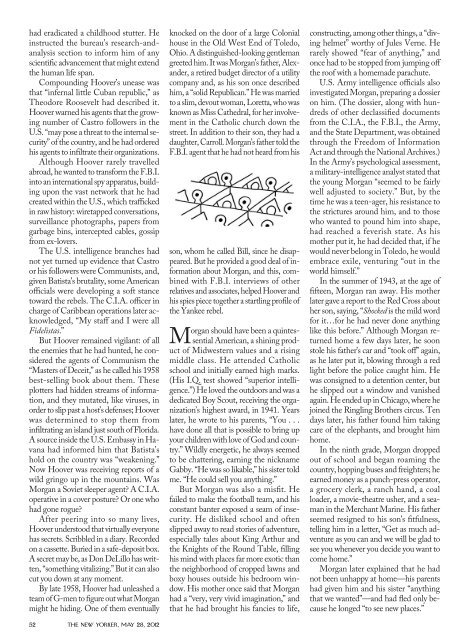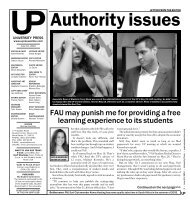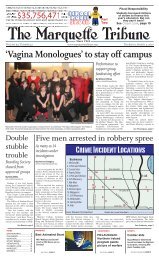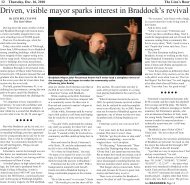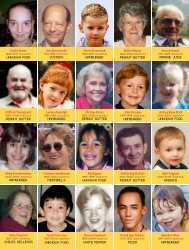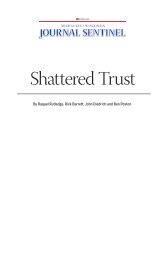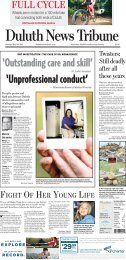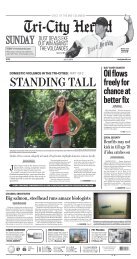THE YANKEE COMANDANTE
THE YANKEE COMANDANTE
THE YANKEE COMANDANTE
You also want an ePaper? Increase the reach of your titles
YUMPU automatically turns print PDFs into web optimized ePapers that Google loves.
had eradicated a childhood stutter. He<br />
instructed the bureau’s research-andanalysis<br />
section to inform him of any<br />
scientific advancement that might extend<br />
the human life span.<br />
Compounding Hoover’s unease was<br />
that “infernal little Cuban republic,” as<br />
Theodore Roosevelt had described it.<br />
Hoover warned his agents that the growing<br />
number of Castro followers in the<br />
U.S. “may pose a threat to the internal security”<br />
of the country, and he had ordered<br />
his agents to infiltrate their organizations.<br />
Although Hoover rarely travelled<br />
abroad, he wanted to transform the F.B.I.<br />
into an international spy apparatus, building<br />
upon the vast network that he had<br />
created within the U.S., which trafficked<br />
in raw history: wiretapped conversations,<br />
surveillance photographs, papers from<br />
garbage bins, intercepted cables, gossip<br />
from ex-lovers.<br />
The U.S. intelligence branches had<br />
not yet turned up evidence that Castro<br />
or his followers were Communists, and,<br />
given Batista’s brutality, some American<br />
officials were developing a soft stance<br />
toward the rebels. The C.I.A. officer in<br />
charge of Caribbean operations later acknowledged,<br />
“My staff and I were all<br />
Fidelistas.”<br />
But Hoover remained vigilant: of all<br />
the enemies that he had hunted, he considered<br />
the agents of Communism the<br />
“Masters of Deceit,” as he called his 1958<br />
best-selling book about them. These<br />
plotters had hidden streams of information,<br />
and they mutated, like viruses, in<br />
order to slip past a host’s defenses; Hoover<br />
was determined to stop them from<br />
infiltrating an island just south of Florida.<br />
A source inside the U.S. Embassy in Havana<br />
had informed him that Batista’s<br />
hold on the country was “weakening.”<br />
Now Hoover was receiving reports of a<br />
wild gringo up in the mountains. Was<br />
Morgan a Soviet sleeper agent? A C.I.A.<br />
operative in a cover posture? Or one who<br />
had gone rogue?<br />
After peering into so many lives,<br />
Hoover understood that virtually everyone<br />
has secrets. Scribbled in a diary. Recorded<br />
on a cassette. Buried in a safe-deposit box.<br />
A secret may be, as Don DeLillo has written,<br />
“something vitalizing.” But it can also<br />
cut you down at any moment.<br />
By late 1958, Hoover had unleashed a<br />
team of G-men to figure out what Morgan<br />
might he hiding. One of them eventually<br />
knocked on the door of a large Colonial<br />
house in the Old West End of Toledo,<br />
Ohio. A distinguished-looking gentleman<br />
greeted him. It was Morgan’s father, Alexander,<br />
a retired budget director of a utility<br />
company and, as his son once described<br />
him, a “solid Republican.” He was married<br />
to a slim, devout woman, Loretta, who was<br />
known as Miss Cathedral, for her involvement<br />
in the Catholic church down the<br />
street. In addition to their son, they had a<br />
daughter, Carroll. Morgan’s father told the<br />
F.B.I. agent that he had not heard from his<br />
son, whom he called Bill, since he disappeared.<br />
But he provided a good deal of information<br />
about Morgan, and this, combined<br />
with F.B.I. interviews of other<br />
relatives and associates, helped Hoover and<br />
his spies piece together a startling profile of<br />
the Yankee rebel.<br />
Morgan should have been a quintessential<br />
American, a shining product<br />
of Midwestern values and a rising<br />
middle class. He attended Catholic<br />
school and initially earned high marks.<br />
(His I.Q. test showed “superior intelligence.”)<br />
He loved the outdoors and was a<br />
dedicated Boy Scout, receiving the organization’s<br />
highest award, in 1941. Years<br />
later, he wrote to his parents, “You . . .<br />
have done all that is possible to bring up<br />
your children with love of God and country.”<br />
Wildly energetic, he always seemed<br />
to be chattering, earning the nickname<br />
Gabby. “He was so likable,” his sister told<br />
me. “He could sell you anything.”<br />
But Morgan was also a misfit. He<br />
failed to make the football team, and his<br />
constant banter exposed a seam of insecurity.<br />
He disliked school and often<br />
slipped away to read stories of adventure,<br />
especially tales about King Arthur and<br />
the Knights of the Round Table, filling<br />
his mind with places far more exotic than<br />
the neighborhood of cropped lawns and<br />
boxy houses outside his bedroom window.<br />
His mother once said that Morgan<br />
had a “very, very vivid imagination,” and<br />
that he had brought his fancies to life,<br />
constructing, among other things, a “diving<br />
helmet” worthy of Jules Verne. He<br />
rarely showed “fear of anything,” and<br />
once had to be stopped from jumping off<br />
the roof with a homemade parachute.<br />
U.S. Army intelligence officials also<br />
investigated Morgan, preparing a dossier<br />
on him. (The dossier, along with hundreds<br />
of other declassified documents<br />
from the C.I.A., the F.B.I., the Army,<br />
and the State Department, was obtained<br />
through the Freedom of Information<br />
Act and through the National Archives.)<br />
In the Army’s psychological assessment,<br />
a military-intelligence analyst stated that<br />
the young Morgan “seemed to be fairly<br />
well adjusted to society.” But, by the<br />
time he was a teen-ager, his resistance to<br />
the strictures around him, and to those<br />
who wanted to pound him into shape,<br />
had reached a feverish state. As his<br />
mother put it, he had decided that, if he<br />
would never belong in Toledo, he would<br />
embrace exile, venturing “out in the<br />
world himself.”<br />
In the summer of 1943, at the age of<br />
fifteen, Morgan ran away. His mother<br />
later gave a report to the Red Cross about<br />
her son, saying, “Shocked is the mild word<br />
for it…for he had never done anything<br />
like this before.” Although Morgan returned<br />
home a few days later, he soon<br />
stole his father’s car and “took off” again,<br />
as he later put it, blowing through a red<br />
light before the police caught him. He<br />
was consigned to a detention center, but<br />
he slipped out a window and vanished<br />
again. He ended up in Chicago, where he<br />
joined the Ringling Brothers circus. Ten<br />
days later, his father found him taking<br />
care of the elephants, and brought him<br />
home.<br />
In the ninth grade, Morgan dropped<br />
out of school and began roaming the<br />
country, hopping buses and freighters; he<br />
earned money as a punch-press operator,<br />
a grocery clerk, a ranch hand, a coal<br />
loader, a movie-theatre usher, and a seaman<br />
in the Merchant Marine. His father<br />
seemed resigned to his son’s fitfulness,<br />
telling him in a letter, “Get as much adventure<br />
as you can and we will be glad to<br />
see you whenever you decide you want to<br />
come home.”<br />
Morgan later explained that he had<br />
not been unhappy at home—his parents<br />
had given him and his sister “anything<br />
that we wanted”—and had fled only because<br />
he longed “to see new places.”<br />
52 <strong>THE</strong> NEW YORKER, MAY 28, 2012


